Experiential Learning in and Outside the Classroom: Developing Business Proposals

Arthur Huang, Ph.D.
Assistant Professor
Rosen College of Hospitality Management
Entrepreneurship is an increasingly important quality for the future workforce in the era of emergent technologies such as artificial intelligence, machine learning, and robotics. Future entrepreneurs face a fast growing and everchanging market environment transformed by these new technologies. Such an environment also requires that higher education should provide students with relevant learning experiences tied to what they may encounter in their future careers. In the context of tourism business education, I have realized that it is of great importance to develop experiential learning strategies that integrate in-class knowledge, innovation, creativity, teamwork, and managerial skills.
Experiential learning is a theory that considers the nature of learning as a cycle responsive to the demands of the environment. Experiential learning entails a process that focuses on engaging students, providing feedback, refining students’ ideas, resolving conflict through discussion and reflection, adapting to the environment (i.e., assimilation and accommodation) and developing products, technologies or solutions (Kolb & Kolb, 2005). Experiential learning is achieved when learners are provided with environments that balance challenge with guidance. Experiential learning is applied by building an environment of trust and by presenting intellectual challenges that promote the development of entrepreneurship, design, innovation and/or management skills. In addition to learning through the analysis of case studies (as currently done in business programs in other universities), our students should also be able to learn from real-life experiences, detect business opportunities with potential clients, design feasible solutions, effectively communicate their business intentions, and refine their business ideas based on their interests, abilities, and passions.
In fall 2019, I had the opportunity to implement experiential learning in teaching HMG 6449 SMART Travel and Tourism course at the Rosen College of Hospitality Management. The course focuses on providing fundamental theories, models, and practices of SMART technologies applied in the travel and tourism industry. It also features hands-on projects and various active-learning activities that engage the students in the learning process, including the preparation of a case study about one application of SMART technologies in the tourism context. The most exciting and crucial component of this course is the inclusion of a business proposal project on inventing/applying one or several promising technologies in the travel and tourism industry. In this project, students were asked to clearly describe the targeted problem, potential clients, market size, key technologies, opportunities, risks, cost estimate, and expected revenue. The project includes several key milestones, such as user interviews, business proposal writing, a “shark-tank” style pitch presentation, and a final project presentation. Figure 1 shows the workflow of this project:
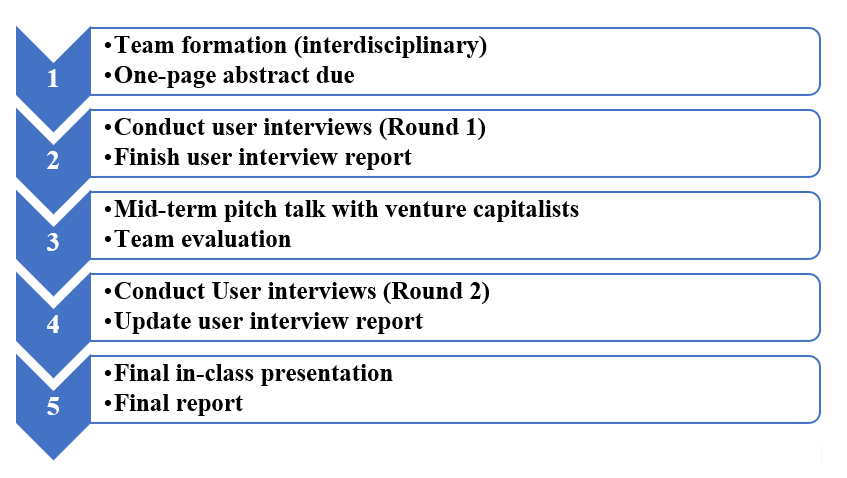
This proposal development process consisted of multiple stages:
- Team formation: students were given the opportunity to identify teammates in class. Each team should have students from different majors and be composed of 2-3 students (5 teams in the class). Instructors would intervene if any students could not find a team. In two weeks, each team was required to submit a one-page abstract of their initial business idea.
- Team activity 1: conducting the first round of user interviews. Each team started by conducting a round of interviews with potential users. The interviews were intended to explore users’ current journeys in a service, identify unknown needs, and provide insights to inform the design of a technological product or service. I encouraged the students to use contextual observation (e.g., observing a participant in the environment), take notes, record audio/video or take photos of participants (if they permit). Then, a two-page summary for each interview, including meta-data (length of the interview, time, place, etc.), key insights, key questions and answers, and key observations, was submitted by each team leader.
- “Shark Tank” Pitch: A mid-term project pitch talk was arranged for each group. This talk took the form of a Shark Tank TV Show. Each team was given 5 minutes to conduct a mock business proposal presentation. Each team produced an 8-slide presentation enriched with visuals to support their explanations, along with hard copies of a mini-proposal (3-4 pages) that provided to the judges. Three venture capitalists from local investment firms served as judges and interacted with the teams during their presentations.
- Team activity 2: Each team conducted a second round of interviews with potential customers for their proposed products/services. The same guidelines for the first round of interviews were applied here. These interviews provided further feedback for the students to refine their business proposals and revise their ideas.
- Final business proposals were submitted and presented. Each team needed to do a final presentation in class along with their proposals. Students were evaluated based on the content of their proposals and their final presentations. The instructor provided immediate feedback on students’ projects after the final presentations.
Implementing the business proposal assignment in this course has allowed me to see exceptional business projects that reflected students’ creativity, teamwork, and analysis skills. I have learned that the students inspired each other in delivering high-quality proposals. Exemplary topics from these projects include: (a) augmented reality mobile applications on cruise ships, (b) smart cards for tourist destinations, and (c) guardian angel bands for hotels (see artifacts).
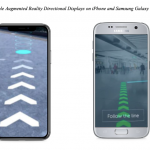
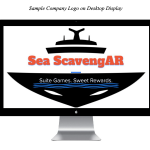
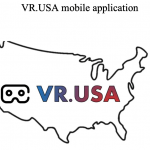
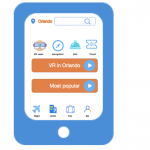
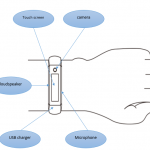
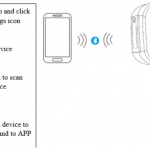
The students’ comments on this business proposal project revealed that this project has increased students’ motivation and engagement, promoted critical thinking, helped the students gain deeper understanding about the tourism market, and encouraged creativity and collaboration. Therefore, I believe that integrating such experiential-learning activities which require students’ comprehensive skills into classes would benefit the students in their future career. Such projects would be applicable to courses with a practical emphasis or industry-driven content.
References
Alice Y. Kolb, & David A. Kolb. (2005). Learning Styles and Learning Spaces: Enhancing Experiential Learning in Higher Education. Academy of Management Learning & Education, 4(2), 193.